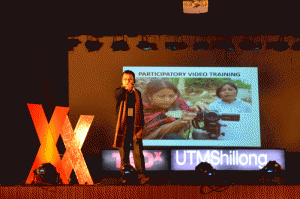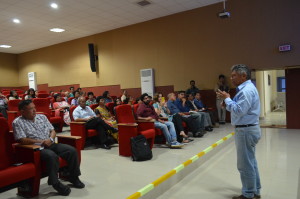Under the aegis of IFAD and the support of Govt. of Canada, TIP developed a digital toolbox on Sustainable and Resilient Indigenous Peoples’ Food Systems for Improved Nutrition, which was launched at the online Side event of the UN Permanent Forum for Indigenous Issues (UNPFII) 21st session on May 4, 2022.
It can be considered a landmark achievement for Indigenous communities worldwide, that TIP, an Indigenous organisation, was assigned by IFAD to develop a methodological tool to be used for IFAD’s work on nutrition and food systems with Indigenous Peoples. The main focus area of the toolbox is to harness the potential of food biodiversity for diversifying the diets of Indigenous Peoples. It guides on how to co-design project activities together with communities by taking into consideration their views, knowledge, and experiences.
The successful development of the toolbox brought to life the culmination of a journey that was seeded by the scientific curiosity of an Indigenous organisation-NESFAS- in the biodiversity hotspot of the Northeast of India. What started as a seed of an idea nearly 10 years ago today has matured into a full-blown food system methodology that shapes food and nutrition assessments and actions across communities. The feat can be regarded as an intercultural meeting of science and grassroots knowledge systems.
In the opening remarks, Antonella Cordone (Ad-interim Senior Technical Specialist, Indigenous Peoples, IFAD) shared, “Indigenous Peoples Food System (IPFS) have traditionally provided healthy diets in diverse environments around the world. However, historical and ongoing disruptions of IPFS have caused profound changes in the dietary patterns of IPs. Continued loss of biodiversity, combined with increased consumption of processed foods, among other factors, lead to various forms of malnutrition”.
The toolbox also describes IPFS and key actions and approaches to strengthening IPFS. It is enriched by beautiful participatory videos produced in collaboration with four communities from Peru, Kenya, India and Solomon Islands. The videos illustrate the importance of biodiversity for Indigenous Peoples’ diets and show how agriculture is combined with food harvesting (wild vegetables, seafood, wild fruits, freshwater fish, and medicinal plants). The videos share local stories from the ground about the strengths of IPFS, ongoing changes, as well as innovative strategies that are emerging in response to global challenges.
One of the speakers at the launch event, Myrna Cunningham, shared that this toolbox truly embarks on the first practical action that has taken place since the UNFSS events of 2021. For it to be launched by an Indigenous organisation along with the Indigenous communities is another big encouragement, she added.
The TIP and its collaborative team executed the toolbox development with the full support and faith of the IFAD and the Canadian Government. The methodology released in the toolbox had been previously tested by Indigenous youth from NESFAS in Meghalaya during their project “No One Shall Be Left Behind Initiative” supported by REC, with the collaboration of food system expert Dr Lukas Pawera.
Phrang Roy, Coordinator of TIP, who was the lead in this project, expressed, “The toolbox, in my mind, must be a start of a more ambitious journey of jointly developing a gathering of Indigenous youths and women to test, implement, and monitor the usefulness of this tool”.
– Explore the toolboxhttps://www.ifad.org/digital-toolbox/indigenous-peoples-food-systems/
– Watch the launch event live https://youtu.be/ojKyKBPzcwo



